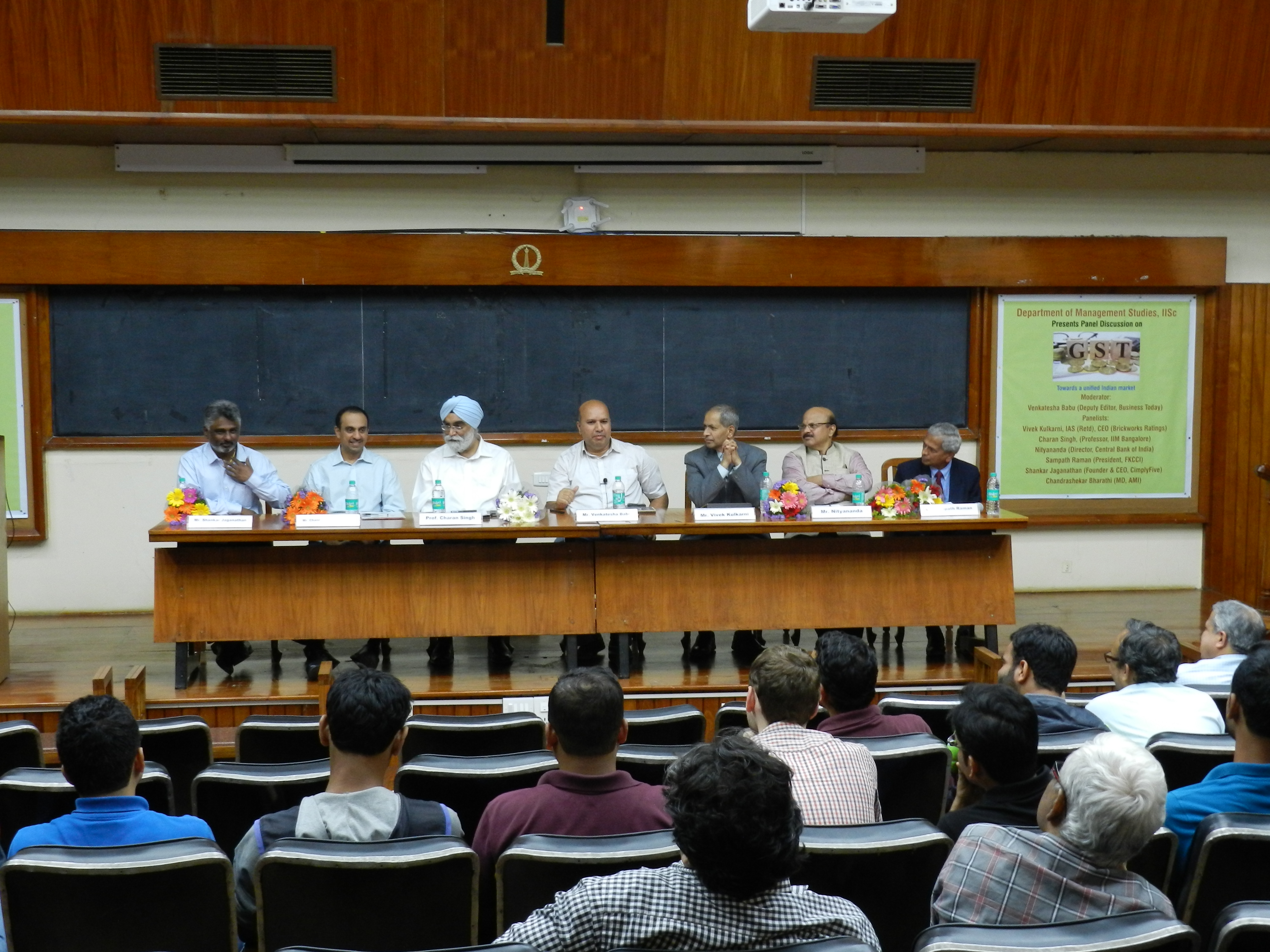A group of experts gathered at IISc to discuss its impacts
“The 49th challenge in the Blue Whale game is filing GST. Everyone knows what the 50th is and I am not going to elaborate on that. That is the kind of challenge the industry and businesses have had to face,” said Venkatesh Babu, Deputy Editor of Business Today, highlighting the drudgery involved in filing GST.
Amid the hullaballoo after GST rollout, the Department of Management Studies, IISc hosted a discussion on 15 September 2017 where a group of experts from different fields debated its impacts on the industry, services, and consumers.

Babu, who was the moderator of the panel, began the discussion by giving a brief introduction to GST. “GST is not an old concept,” he said. “The UK adopted GST in 1973, followed by several other countries.” The benefits that GST offers, according to him, is that it formalises the informal sector where a majority of the workforce is employed, makes it competitive for all players and improves revenue for the government, thus enabling it to invest in social schemes.
In India, GST came into force on 1 July 2017. The Vajpayee government, in 2000, had wanted to implement GST, so it took 17 long years for it to become a reality. The immediate impact of GST rollout was an increase in inflation and decrease in growth. GDP growth in the second quarter of this year hit a three-year low of 5.7%. But Charan Singh, a visiting faculty at the Indian Institute of Management, Bangalore, believes that the decrease in GDP growth is due to a decrease in investments.
N Nityananda, Director, Central Bank of India, was of the opinion that GST is a good concept but a roadblock to its success was poor implementation on part of the government. Explaining the government’s predicament, Vivek Kulkarni, retired IAS officer and CEO of Brickworks rating, threw light on how getting a political consensus was an uphill task — Article 246A, under which GST was formed, was structured in such a manner that the Centre had to get ratification of 20 out of 29 states. “The Constitution [One hundred and first amendment] Act , 2016, would have expired on 16 September 2017 had they not hurried with the implementation of GST. Bringing a consensus again would have been a challenge.”
“The Constitution [One hundred and first amendment] Act , 2016 would have expired on 16 September 2017, had they not hurried with the implementation of GST. Bringing a consensus again would have been a challenge.”
Speaking about how GST rollout has impacted the industry, Sampathraman, Chairman and Managing Director of DPK Engineers Pvt Ltd, expressed his shock over the setting up of this poor law despite the government having over 1500 advisors. GST is hailed as a single tax by the government, “and yet we have three different taxes: Central Goods and Services Tax (CGST), State Goods and Services Act (SGST) and tax shared by both state and central governments called Integrated Goods and Services Tax (IGST).”
He gave an example of how the manufacturing sector that transports goods to other states has been hit due to IGST levied on them. This places a huge burden on their working capital, he said.
Though multiple tax rates at 5, 12, 18 and 28% were made keeping the plight of the poor in mind, it has attracted a lot of flak. Nityananda pointed out that this new reform at multiple tax rates is complicating the tax system. “Honest businessmen are getting harassed,” he said, “and there will be an end to liberalisation thereby bringing back the inspector raj system.”
“Honest businessmen are getting harassed and there will be an end to liberalisation thereby bringing back the inspector raj system”
To know more about how start-ups are faring after GST rollout, Babu asked Shankar Jaganathan, Founder and CEO of Cimplyfive, for his views. A section of start-ups, he said, “are overjoyed” because they have access to the Rs. 16000 crore market for GST implementation that has opened up. But this is not true for all start-ups. The GST rollout means they pay taxes for everything even though they may not make any profits in the first two years of their operation. The amount of paperwork is also a problem, Jaganathan said, which was not the case earlier.
Talking about the advantages GST has brought in, Chandrashekar Bharathi, MD, AceMicromatic MIT, believes GST implementation is a step in the right direction. He’s a part of the advisory and policy-making body to the government. “In a council meeting held recently,” he said, “people from various industries participated, and the general consensus is that it is painful at the moment. But a presentation by the logistics sector painted a very positive picture. The logistics business today stands at 150 million dollars and is expected to grow to 300 million in the next few years.”
“The government could have implemented GST in a state as a proxy and replicated it nation-wide based on its impacts”
On the other hand, Singh voiced concerns on financial literacy: many shopkeepers are not aware of the taxing reform leaving them confused; though the government’s move to explain GST through advertisements in newspapers is commendable, it has done little to address the lacunae. Talking about how the government could have ensured a smoother rollout, he said, “The government could have implemented GST in a state as a proxy and replicated it nation-wide based on its impacts”. He predicts that India will take another 18 months to recuperate from the jolt.




